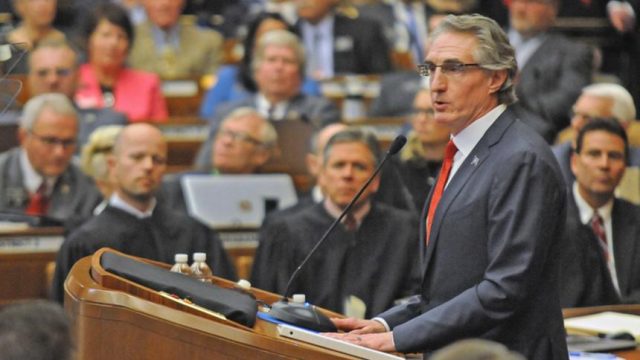UND Economics Professor Says He’d Flunk North Dakota’s Revenue Forecasters

TOM STROMME.Tribune Governor Doug Burgum opened North Dakota's 65th legislative assembly on Tuesday afternoon in front of a joint session of the legislature where he delivered the State of the State address. Gov. Burgum touched on a number of topics in the address but a continuing theme was lifelong education. "Learning begins with humility. Everyone has something to teach us," he said.
Revenue forecasts in North Dakota are extremely important.
That’s because our Legislature doesn’t meet very often (nor do most citizens want it to meet often, I think). So every odd-numbered year our lawmakers are tasked with making at two-year budget based on what professional forecasters think the state will collect in tax revenues based on assumptions about things like economic activity and commodity prices.
It’s not easy. Especially when the forecasts tend to not be very accurate, which has been the case in North Dakota for years now.
I’m not just talking about the state’s post-oil boom revenue decline which will require that lawmakers make a lot of tough budget decisions in the last weeks of this year’s session. The revenue forecasts were wildly inaccurate back during the oil boom as well. For instance, back in the 2011-2013 biennium revenue forecasters were off by 49 percent, or about $1.7 billion.
[mks_pullquote align=”left” width=”300″ size=”24″ bg_color=”#ffffff” txt_color=”#000000″]”I don’t think we can trust these numbers at all,” he said of the most recent forecast lawmakers were delivered last week.[/mks_pullquote]
Not only has Moody’s Analytics, the firm which has the contract to provide forecasting services to the state, been wildly inaccurate when revenues were booming they’ve failed to give lawmakers a reliable prediction now that revenues are in decline.
It’s so bad that UND economics professor David Flynn told me in a radio interview today that, were the forecasters in his class, he’d fail them.
“This is an exercise in what not to do and how not to run a forecast process,” he told me, disclosing that he bid on the contract to handle forecasting for the state.
Flynn said other states, even those with less volatility than North Dakota’s commodity-based economy – do regular updates to their revenue forecasts. He said North Dakota’s updates tend to be “sporadic” making it hard to make prudent adjustments to the economic models used to produce the numbers lawmakers base tax and spending policy on.
“I don’t think we can trust these numbers at all,” he said of the most recent forecast lawmakers were delivered last week.
He also questioned whether inaccurate forecasts which underestimated revenues during the state’s oil boom years might have put them in the habit treating surpluses “like found money.”
There’s no question that bad revenue forecasts can inform bad policy choices, whether the forecasts are too low or too high.
Here’s the full audio of the interview:
[fcc_jw_podcast key=”C4eGwbWT” player-image=”139345″]




